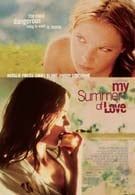Mona (Nathalie Press) is a plain girl from a working class family. Her parents are gone and all she has left is the family-owned pub and her older brother Phil (the excellent and frightening Paddy Considine), fresh out of prison and having recently joined the zealous ranks of the Born Again. Acknowledging his past life of wickedness, he now holds prayer/chant meetings in the living room, disposes of all the whiskey, and constructs giant metal crosses to display his faith to the neighbors. Between the poverty and the alienation, Mona’s life is without meaning until she meets Tamsin (Emily Blunt), the daughter of a wealthy family across town, just arrived from boarding school and home for the summer. The two begin a desperately necessary relationship, despite their social differences and disapproving neighbors. With Mona’s happiness and future riding entirely on Tamsin, their relationship straddles a very dangerous line between everlasting love and absolute destruction. Not of any help is Phil, attempting to save his sister with religion and threatening her with violence at the same time. Can Mona find fulfillment? This is the question the film poses.
I don’t know about other guys my age, but when any film’s summary includes the words “teenage” and “lesbians”, my interest tends to be piqued in a very specific way. For those seeking just another cinematic girls only “bump ‘n’ grind” along the lines of Wild Things, perhaps a trashier film should be sought. My Summer of Love is not trashy, in any respect. Actually it’s a very real, un-romanticized coming-of-age film, which is very erotic despite its lack of gratuitous skin. The eroticism lies in the caustic intensity with which these girls stare into each other’s eyes, and in the intimacy with which Pawlikowsky films them. In one scene shot in almost complete darkness, two silhouettes vow to kill the other should ever one stray. Yes, the film tends to be intense, and such intensity can oftentimes lead to beautiful implosion.
Pawlikowsky’s lens is deliberately lulling. His Yorkshire countryside is altogether gorgeous and oppressive. Just as Mona is trapped, so are we in the haze, comfort and false security of the fleeting summer. His soothing impressionistic cinematography falls somewhere between the work of David Gordon Green and Sofia Coppola. The nuanced performances he evokes from all three of his leads are excellent, but Press’s and Considine’s stand out considerably. Press is completely indistinguishable as Mona, Considine is nothing short of brilliant, and based on this film great things lie in wait for all three of these actors.
Pawlikowsky’s film showcases perfect examples of life’s joys and cruelties through the eyes of a very disadvantaged teenager. The ending is shocking, horrible and resolves very little, simply adding to the masochistic, deviant pleasure one receives from watching a film that is all at once loving, erotic, mysterious and horrifying. My Summer of Love is a complex, moody piece and a cautionary fable; very well made but the kind of film best appreciated years later on video, discovered as a buried treasure. If you see it, sit down expecting more Virgin Suicides and less D.E.B.S.
Most Popular




